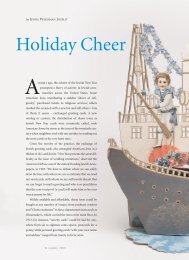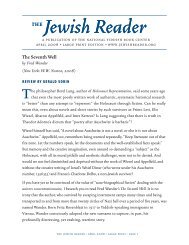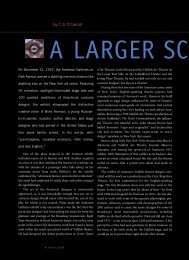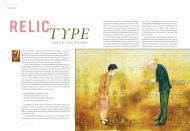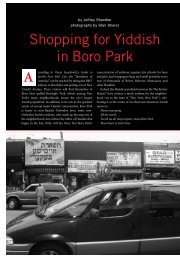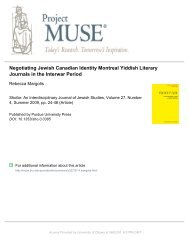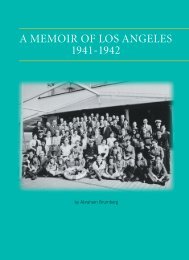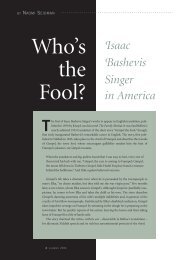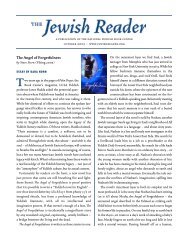Download The Jewish Reader - Yiddish Book Center
Download The Jewish Reader - Yiddish Book Center
Download The Jewish Reader - Yiddish Book Center
You also want an ePaper? Increase the reach of your titles
YUMPU automatically turns print PDFs into web optimized ePapers that Google loves.
Agnon also has an uncanny ability to enter his characters’minds. <strong>The</strong> description of Hirshl’s long bout of insomnia(chapter 24), for example, which ultimately led to hismental breakdown, is a masterpiece. I think the key toAgnon’s insight into his characters and their lives is hisnon-judgmental outlook. He seldom condemns the foiblesthat he evokes. He accepts what he sees, whether it coincideswith his professed values or clashes with them.Knabenhut, the leader of the town’s socialist faction, is nota man of whom a traditionally religious Jew would approve,but this is hardly the description of an enemy:As small and spry as a leprechaun and as smoothlyshaven as a matinee idol, Dr. Knabenhut dartedabout town organizing the workingmen. Ever sincehis arrest by the authorities for spreading illegalpropaganda, he was brimming over with confidence.…<strong>The</strong> whole of Szybusz felt Knabenhut’sknout and lucky was the man whom it spared, thoughif it came down hard on the well-to-do it seemed softas a caress to the poor. (p. 212)Even Stach, the Ziemlich family’s Gentile coachman, thequintessential gentile in Agnon’s fictional world, isdescribed without repugnance. Agnon is interested in aman capable of direct contact with horses and dogs. Henotices Stach and brings him to the reader’s attention.Agnon’s non-judgmental interest in his characters andhis delight in evoking the details of their lives are clearly hismain reasons for writing A Simple Story. <strong>The</strong>re are abundantsigns in the narrative that he was having great funwith it. Although insanity was a terrible blot on family reputationin Galician <strong>Jewish</strong> society, Hirshl’s name emergesunscathed because of a minor joke that history plays oneveryone. Just when he has his nervous breakdown, a new,unbribable draft board is conscripting young men, and theJews of Szybusz take Hirshl’s madness to be feigned.Indeed, he is rather admired for his clever success. Anotheramusing touch is Agnon’s mention of one of the two subscribersto Hebrew newspapers in Syzbusz: “a certainyoung man who wrote Hebrew poems. God in heaven knewwhat made a young fellow like him care for Hebrew. Did hethink it was a ticket to riches or fame?” (p. 211) <strong>The</strong> year inwhich A Simple Story is set, 1904, is also the year whenAgnon, who did not leave Buczacz for good until 1908,published his first Hebrew poem. Who, then, could thatyoung Hebraist have been?A man who changed his own family name, Czaczkes, toAgnon (a permanent reference to the first story he publishedin Palestine, “Agunot” [in S.Y. Agnon, A <strong>Book</strong> thatWas Lost and Other Stories. New York: Schocken, 1995, pp.35-47]), was clearly aware of the power of names. I havementioned the Ziemlich family name. In addition, themeaning of Blume Nacht is “night flower” – hardly a signthat she is the woman Hirshl was meant to marry. Tsirl,whose name means a precious ornament, is altogether toopowerful for such a pretty name. Gedalia, Mina’s father,bears a name that could be taken to mean, God has mademe great, which is what he believes. Boruch Meir, a benignpresence in the story, means blessed, shedding light. YonaToyber, the matchmaker, has a curious name: his first namemeans “dove” in Hebrew, and his last name evokes the<strong>Yiddish</strong> word for dove – and he is a gentle agent of peaceand social order.<strong>The</strong> physician who cures Hirshl’s madness is namedLangsam, which means slow in German. Why slow?Perhaps because he has the patience to see processesthrough to the end. Halkin notes correctly that Langsam isthe only truly wise character in the book, and his slownessis part of his wisdom. <strong>The</strong> therapeutic method he uses intreating Hirshl is subtle and tailored to his specific case.Langsam simply sits down with Hirshl and holds rambling,reminiscent conversations with him:Sometimes he repeated old stories to Hirshl andsometimes he related new ones. Though he had studiedin famous universities, lived in great metropolises,and frequented celebrated theaters and operahouses, all these places might as well never haveexisted: nothing had remained in his memory, itseemed, but the little town he grew up in, with itsmerchants saying Psalms in the marketplace, its rabbimaking bookmarks with his fingernails, and its studentsstruggling to decipher them. (p. 189)Halkin says: “By means of his seemingly aimless stories,he builds up in his patient a positive image of small-town<strong>Jewish</strong> life, thus getting him to accept that the conventionalsociety of the Galician shtetl in which he is condemnedto live has a dignity and value of its own and that there isno need to feel shame or anger at belonging to it” (afterword,p. 244). That, I think, is true as far as it goes, but onecan go much farther. After all, much of Agnon’s writing isan evocation of the region where he grew up. Langsam’sthe jewish reader / january 2003 / page 5
therapeutic method is Agnon’s literary project. I suggestthat, at bottom, Agnon wanted to cure the <strong>Jewish</strong> people byquietly and patiently telling us simple stories about the lostworld from which we all descend. He tells these storiesunsentimentally yet fondly, but not to reconcile us to life ina similarly limited world. He tells them to us in order tosave us from the madness and terrors of modern life.Langsam also offers Hirshl a moral philosophy:I sometimes think that, even if we never pay backthose we owe the most to, it’s enough that they sufferno harm from us. … We can do good to someone andnever be repaid by him, but someday he will do goodto someone else, and that person will do good tosomeone else. And so good gets passed on, and theworld remains halfway livable. (p. 190)Actually, Agnon uses a stronger expression here: “thus,goodness is compensated, and the world remains in existence.”Langsam was kind to Hirshl, telling him stories aboutthe shtetl of his youth. Agnon is kind to us, telling us storiesabout the Buczacz of his youth. <strong>The</strong>ir kindness, if we cherishit, may engender kindness in us, so their stories will help preservethe world. Will we be fortunate enough to possess andtell stories with that same sustaining power? JRQUESTIONS FOR DISCUSSION1. <strong>The</strong> narrator always calls the main character “Hirshl,”but Mina calls him “Heinrich.” What does this suggest?2. Do you think that Agnon planned the plot of A SimpleStory in advance, or do you think that it developed as hewrote?3. On the train to Lemberg, where he is going in order totake Hirshl home from Dr. Langsam’s sanitarium, BoruchMeir encounters a Gentile soldier and has an odd conversationwith him. On the way back from Lemberg, the trainis full of argumentative Jews. Why does Agnon bothertelling us such things?4. Yona Toyber, the matchmaker, chooses to marry GetzelStein’s hunchback sister soon after his wife dies, and thematch seems to be a successful one. Does this tell us somethingabout Toyber that we could not have guessed earlierin the novel?5. Agnon loves to describe food. Look at a few of thedescriptions of meals and cookery in A Simple Story and seewhat they contribute to the book.6. Halkin proposes a number of explanations for Hirshl’smental breakdown, which he finds in Agnon’s narrative:hereditary illness; emotional tension, worry, lack of sleep,physical exhaustion, and too many barbituates; escape froman insoluble conflict between desire for Blume and the socialand marital roles he is forced to play; and a severe oedipalcomplex. I might add deep loneliness and feelings of isolation.Which of these explanations seems likeliest to you?7. On several occasions the narrator says that Hirshl hascompletely forgotten how to read the traditional <strong>Jewish</strong>texts that he studied before working in his parents’ store. Isthis oblivion realistic? Is it necessary for understandingHirshl’s character?8. At the end of the book, Hirshl and Mina’s first son,Meshulam, has been sent away permanently, to be raised byMina’s parents, while their second, unnamed child remainswith them. What does their first child symbolize, and whyis it necessary, on the symbolic level, for him to be broughtup by Mina’s parents? JRJeffrey M. Green has been living in Israel since 1973. He hastranslated several books by Aharon Appelfeld from Hebrew toEnglish as well as a story by Agnon, “Pisces,” which appears inA <strong>Book</strong> That Was Lost. With Trudi Birger he wrote ADaughter’s Gift of Love, a Holocaust memoir that has beentranslated into more than ten languages. He has also written acollection of essays about translation, Thinking ThroughTranslation, a book of poetry in English, and two books inHebrew. He has just completed a translation of the <strong>Book</strong> ofJob, with commentary by Amos Hakham, for the Rav KookInstitute. He is also a dedicated amateur saxophone player.the<strong>Jewish</strong> <strong>Reader</strong> is a publication of theNational <strong>Yiddish</strong> <strong>Book</strong> <strong>Center</strong>, Amherst, MA.Editor: Nancy ShermanWWW.JEWISHREADER.ORGthe jewish reader / january 2003 / page 6



